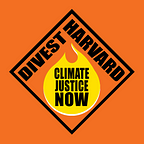New Overseers Agree: Harvard is Falling Short on Climate
For second consecutive year, alumni deliver mandate for climate action
Every year, Harvard alumni elect new members to the Board of Overseers, one of the university’s two governing boards. In 2020, the Harvard community secured a historic victory by electing three pro-divestment candidates to the board. Now, despite the university changing the election rules to limit democratic participation, alumni have once again delivered a resounding mandate for climate action. On Thursday, Harvard announced the results of the 2021 election — and a majority of the newly-elected candidates agree that when it comes to the climate crisis, Harvard can and must do more.
Among the victorious candidates was Harvard Forward nominee Megan Red Shirt-Shaw (HGSE ‘17), who ran for the board on a platform of fossil fuel divestment, inclusive governance, and racial justice. Petition candidates have not won in consecutive years since 1987, making this result yet another testament to the resounding desire of alumni for change. “I look forward to working with Fossil Fuel Divest Harvard to ensure climate leadership while developing stronger networks for climate justice across Harvard and beyond,” she said.
Harvard University has refused to divest from the fossil fuel industry for nearly a decade, even as peer institutions like Oxford, Cambridge, Cornell, Brown, and the University of California recognize the financial, legal, and moral imperative to withdraw investments in the industry destroying our planet and our future. Instead, Harvard has touted a 2050 decarbonization pledge that fails to align with scientific consensus or the will of the student, faculty, and alumni community. The university is estimated to hold roughly $840 million in fossil fuels as of the last fiscal year.
Overseer-elect Mark Carney (College ’87) has also called for divestment, declaring in a candidate questionnaire that he supports “divestment of any company in any sector that is on the wrong side of climate history.” (Given that no major fossil fuel company is aligned with the aims of the Paris Agreement — and given the industry’s continued effort to spread disinformation, attack Harvard faculty, and lobby against climate policy — it’s no question which side of history these companies come down on.) Additionally, Carney has criticized as insufficient Harvard’s 2050 commitment in an election public forum.
Raymond Lohier (College ‘88), another newly-elected overseer, has likewise noted the shortcomings of Harvard’s 2050 decarbonization pledge: “When I saw the reference to 2050, that seemed to be awfully far away. We can’t have a situation where most of the students who are calling for divestment today are going to be in their 50s by the time this pledge is fulfilled.”
In addition to Red Shirt-Shaw, Carney, and Lohier, the two remaining elected candidates, Sheryl WuDunn (HBS ’86) and Christopher Howard (HBS ’03), both have strong records on issues of racial and social justice. Given the immense interconnections between racial equity and climate justice, Fossil Fuel Divest Harvard (FFDH) looks forward to collaborating with them as well.
FFDH congratulates all overseers-elect and looks forward to working with them in the coming years — because ultimately, Harvard’s future depends on its willingness to take bold climate action. FFDH continues to believe that the university has a real potential to use its outsize influence to make a meaningful difference in the fight for a just and stable future. But to make that vision a reality, Harvard must take the baseline step of divesting from planetary destruction and reinvesting in a more just and sustainable world.
Follow Fossil Fuel Divest Harvard on Twitter, Facebook, Instagram, and TikTok. And want to join one of our meetings and see what we’re all about? Fill out this interest form!
